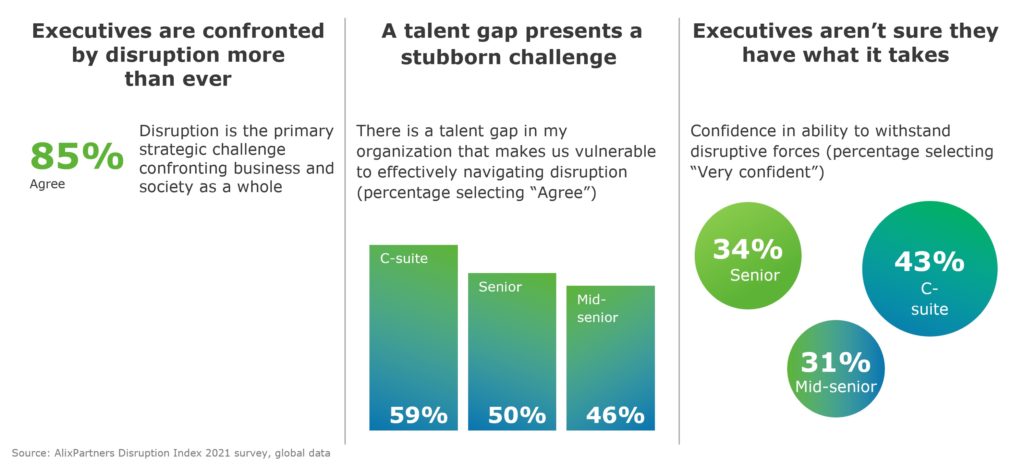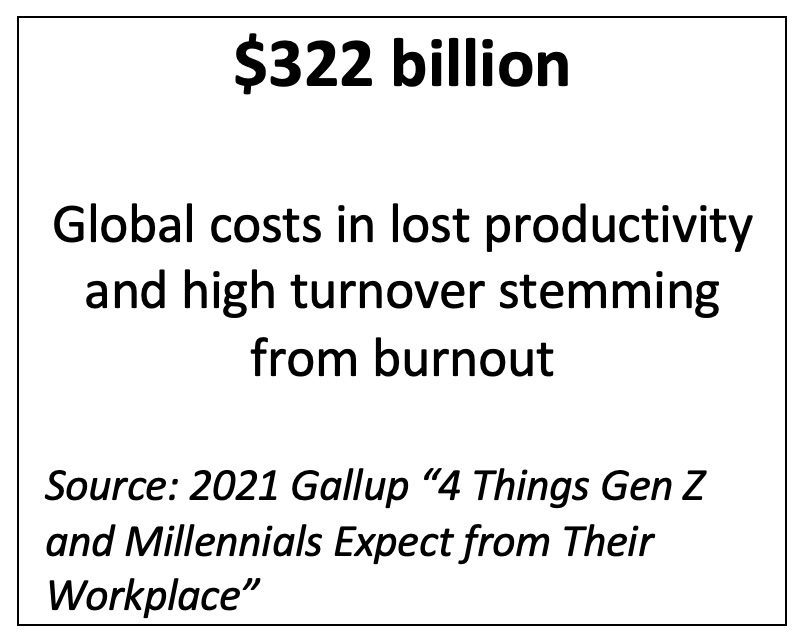 Climate crises and environmental disasters. Covid-19 and its variants. Social upheaval. Racial justice reckoning. Geopolitical conflict. Washington dysfunction. These and other disruptive forces are driving business leaders to rethink virtually every aspect of how their organizations operate. Disruption isn’t expected to ease up anytime soon–and it’s keeping business leaders awake at night. In the AlixPartners Disruption Index 2021, which surveyed more than 3,000 senior executives from an array of industries around the globe, 85% of respondents agreed that disruption constitutes the primary strategic challenge confronting business and society, today and in the future.
Climate crises and environmental disasters. Covid-19 and its variants. Social upheaval. Racial justice reckoning. Geopolitical conflict. Washington dysfunction. These and other disruptive forces are driving business leaders to rethink virtually every aspect of how their organizations operate. Disruption isn’t expected to ease up anytime soon–and it’s keeping business leaders awake at night. In the AlixPartners Disruption Index 2021, which surveyed more than 3,000 senior executives from an array of industries around the globe, 85% of respondents agreed that disruption constitutes the primary strategic challenge confronting business and society, today and in the future.
In the face of these disruptions, however, leaders aren’t sure their organizations have what it takes to withstand—much less take advantage of—the forces reshaping the global business landscape. And when it comes to having what it takes, talent spells the difference between success and failure. Indeed, 59% of the survey’s participating C-suite executives perceive a talent gap in their organization that they think makes them vulnerable in their efforts to effectively navigate these disruptions.
Disruption and the talent challenge are shaking executives’ confidence
 Demand for the right talent—not just people who excel in disciplines such as data analytics and digital transformation–is swiftly outstripping supply. Why? People have grown far more selective about who they want to work for, in part because the pandemic has prompted deep questioning among the four generations in the workforce:
Demand for the right talent—not just people who excel in disciplines such as data analytics and digital transformation–is swiftly outstripping supply. Why? People have grown far more selective about who they want to work for, in part because the pandemic has prompted deep questioning among the four generations in the workforce:
• Do I believe in my organization’s purpose, mission, and values?
• Do I trust and respect my leaders? Are they ethical?
• Does leadership balance profits with people?
• Is my employer making society a better place?
• What are my career development opportunities at this company?
Many people—including the roughly 50% of the U.S. workforce that are Millennials and Gen Z—are looking for specific commitments and capabilities in their leaders. And depending on what they see, they will commit or switch to employers in line with their needs and values.
What employees are looking for
Disruption has altered how employees make decisions about their work lives. Companies that don’t take time to understand workers’ priorities as well as their decision process risk falling behind in the talent war. This is especially true regarding Millennials and Gen Z.

What do these younger people want? A recent Gallup study found that they’re drawn to organizations that care about their well-being in all its forms: physical, emotional, social and career. They also look for firms that have ethical leaders at the helm. For young Millennials especially, an additional priority is a diverse and inclusive work culture, while older Millennials value open and transparent leaders. Digital natives (Gen Z and younger Millennials) especially voice their opinions through social media and quickly express their values through their social networks, buying choices, and, yes, their decisions about where to work.
For Gen X’s and Baby Boomers, ethical leadership is paramount, followed by organizations’ overt caring about employees’ well-being, followed by companies’ financial stability.
Transformative leadership: An antidote to disruption–and a powerful weapon in winning the talent war
With competition heating up for the talent required to successfully navigate disruption, executives are wondering how their organizations’ already strained talent-sourcing resources can cope. One way they can help is by mastering transformative leadership.
Transformative leaders embody distinctive characteristics. For instance, they nurture an organizational culture where the values and sense of purpose that matter most to employees are lived—not just talked about—in key policy areas such as talent recruitment, performance management, customer service, and compensation. These leaders demonstrate humility, empathy, and authenticity. For example, they candidly own up to mistakes and make sure their behavior reflects their own and their company’s values. As such, they serve as role models and culture carriers that resonate with the needs and values of a younger workforce.
Equally important, transformative leaders operate with a learning mindset. They encourage people to take risks and then to extract insights from the inevitable setbacks. They ensure that employees have plentiful opportunities to grow their skills and advance in their careers. And they continually seek out opportunities to learn, grow, and develop themselves. Companies that do not make a deliberate and outsized effort to train and mentor their people will lose them to those that do.
Importantly, transformative leaders have high levels of emotional intelligence. They’re able to recognize their own as well as others’ emotions and to use emotional information to guide their thinking and behaviors, and to make and communicate their decisions with empathy.
Examples of Transformative Leaders in Action
Stan Bergman, Henry Schein
Amid Covid-19, Bergman has set the example for his leadership team by making individual sacrifices like salary cuts, over-communicating the firm’s longstanding values and culture, being physically visible and present as much as possible, and connecting tirelessly with employees. He has relentlessly pursued new COVID testing distribution efforts to get as many tests into as many provider hands as possible.
Mary Barra, General Motors
Barra notes that “behaviors, not inspiring slogans, determine the culture of an organization,” and has emphasized the importance of winning employees’ hearts and minds as well as empowering them. According to Equileap’s 2018 Global Report on Gender Equality, GM is one of just two global businesses that have pay equality in top, middle, and bottom bands as well as no overall gender pay gap across the company.
Yannis Rodocanachi, BH Cosmetics
Rodocanachi strives to effect positive change by incubating and acquiring Gen Z-founded brands. He stated: “The way we recruit, the way we import products, from HR, supply chain, the types of vendors and the partners we work with, the products we develop, how we develop and manufacture and sell them–every aspect of the company has to be in line with our four values: diversity and inclusion, sustainability, civil engagement, and female empowerment.”
Marc Benioff, Salesforce
Benioff maintains that business constitutes the greatest force for change in the world, and his actions back it up. His efforts to solve some of the world’s most pressing problems include aggressively lobbying for a bill in San Francisco that aims to raise corporate tax dollars to provide housing and services for people experiencing homelessness. He has also launched a campaign to plant 1 trillion trees by 2030.
Transformative leadership starts with transforming yourself
The best leaders don’t shy away from looking in the mirror and considering how they can transform themselves to better guide their organizations. This self-assessment can take courage, but asking some tough questions is a good start:
• What are your most deeply held values, and to what extent do you live (demonstrate) them in your organization?
• What do you see as your organization’s purpose–its reason for existing beyond making a profit? How clearly is that purpose communicated in your workplace?
• How well do you and your executive team understand what employees from different generations want from you and the organization–and how much do you and your team genuinely care?
• In what ways does your organization support employees’ well-being? How might it improve in this area, if needed?
• How emotionally intelligent are you, and how might you strengthen this critical form of intelligence in yourself and your team?
• To what degree does your organization’s culture support diversity, equity, and inclusion? What ideas do you have for improving the organization’s efforts in these areas?
As disruptions continue to reshape employees’ values, expectations, and needs, senior executives who excel at transformative leadership will stand the best chance of winning the talent essential for thriving amid disruption. By asking themselves probing questions–and answering them honestly–executives can take the first steps toward mastering this uniquely powerful leadership style.
